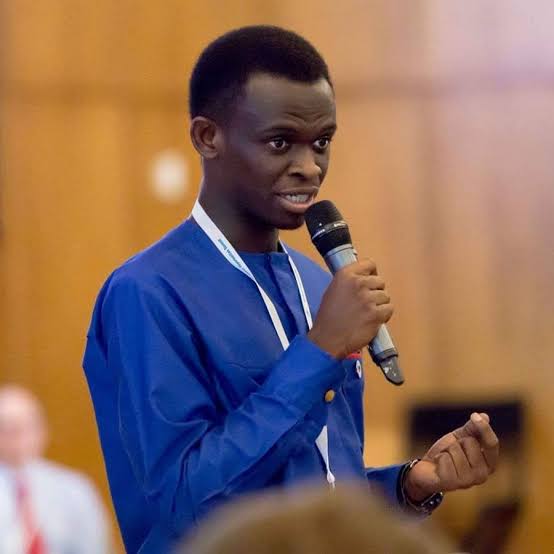By John Ikani
The official language of Nigeria is English. Nigerians are taught in English, they also speak and write English pretty well. Citizens of the African most populous country also tender applications to study abroad in English. They email institutions back and forth in English. Yet, they are required to prove English proficiency via tests that cost about 75,000 Naira (more than twice Nigeria’s minimum wage) to prove that they can speak English!
Also, these English tests expire every 2 years, a development which makes many wonder if English knowledge expires.
For Ebenezar Wikina, it was a deal-breaker. The young Nigerian from Kono in Khana Local Government Area of Rivers State made it clear in 2020 that he would rather forfeit his admission to read a business degree at Nexford University, US when the institution required that he provide proof of his English proficiency.
Wikina had never written the test and sent a strong-worded response to the school that surprisingly caused them to change their stance on the subject (requirement of proof of English proficiency before admission).
His doggedness eventually led the school to introduce a new policy called Academic Evaluation Pending (AEP) which allows prospective students to take their first course at Nexford and have their grades prove if they understand English or not.
Since then, Wikina has been on the frontlines, campaigning against English proficiency tests, a movement which he conceived in 2015 when he started applying for scholarships and opportunities abroad.
Wikina works as an Advocacy Coordinator at PIND Foundation, an corporate social organization established by Chevron Corporation.
He was awarded the first-ever Soundcity MVP for Community Development in 2019, the Mandela Washington Fellowship in 2020, the Nigerian Economic Summit Group Bridge Fellowship in 2021, the Global Investigative Journalism Network fellowship in 2017, and two nominations for the Future Awards Africa in 2016 and 2018 respectively.
In this exclusive interview with Heritage Times, Wakina sheds more light on the gains of his advocacy and why everyone should join the conversation. See excerpts from the interview below.
How is the Academic Evaluation Pending (AEP) working out for students from commonwealth nations at Nexford university?
Students who do not wish to write English proficiency tests can opt for the AEP pathway. Anyone who opts for the AEP program would be allowed to take the first course of the program. Passing the course is an evidence of having a good command of English language and you will be allowed to continue with the academic program.
Has the AEP pathway been running smoothly? Any complaints so far?
The program has been running smoothly so far, even though there were a few challenges with the implementation earlier. However, no beneficiary has so far reached out to me to complain about hitches. It has been a smooth ride.
Is Nexford the only university that has created the AEP? are other universities working on something similar that you know of?
The AEP program is exclusive to Nexford university at the moment, but there are quite a few colleges in Canada that accept attestation letters of English proficiency from schools to grant admission without English proficiency tests. But for most universities, the English proficiency test is a must. This is why we’re advocating for more universities to do away with such tests.
Heritage Times is aware that you have launched a campaign on Twitter against a version of the English proficiency test known as IELTS with the hashtags #ReformIELTSPolicy and #NOIELTSNigeria. Considering the ban on Twitter operations in Nigeria, what other medium are you exploring to promote the campaign?
The U.S. version of the English proficiency test is known as the TOEFL while that of the U.K and Australia is called the IELTS. I was on the morning show on BBC World service a few weeks ago to promote the #ReformIELTSPolicy and #NOIELTSNigeria advocacy.
The BBC as we know it is owned by native English speakers. We enjoyed good audience and reactions from English-speaking countries who were surprised to know that students from Nigeria, Ghana and other Commonwealth nations are subjected to the IELTS despite their good command of English language which sometimes surpasses those of native English speakers.
We also utilize local radio stations here in Nigeria to push our campaign and have left footprints on news websites, blogs, and other social media platforms regarding the subject matter.
Your advocacy against English proficiency tests required from Africans from commonwealth nations seems more focused on IELTS than TOEFL. Can you shed light on the reason?
Yes, Nigeria is a former British colony. Thus, we have a stronger case with the IELTS. If we can effectively deal with the IELTS policy, TOEFL will have no reason to hold onto theirs.
Let’s get things in perspective, Why #ReformIELTSPolicy instead of #ScrapIELTSPolicy or #EndIELTSPolicy?
Instead of saying #EndIELTSPolicy or #ScrapIELTSPolicy, the proper hashtag is #NoIELTSNigeria, #NoIELTSGhana and #NoIELTS – any other country that wants to join the campaign. The two hashtags #ReformIELTSPolicy and #NoIELTSNigeria go side by side.
The reason #ReformIELTS came up is because we believe that there is a policy that mandated IELTS. For that policy to change – if one wants to use policy language – one should say reform. By definition, policy reform is a process in which changes are made to laws, regulations and institutions in order to achieve a goal. In this sense, the goal we are trying to achieve is language equality.
Heritage Times is also aware that you’re a member of the British Council Youth Board to effectively promote the #ReformIELTSPolicy and #NOIELTSNigeria campaign. What other bodies, organizations or partners are you working with to promote this advocacy?
Between me and everybody, the main reason I applied to be on British Council Youth Board was to see how possible it was to push the #ReformIELTSPolicy and #NOIELTSNigeria campaign from the inside. It’s one thing to leverage the media as a powerful tool, but achieving results is a function of inside work.
Asides being on the British Council Youth Board, I am a fellow of the Nigerian Economic Summit Group Bridge. I and my co fellows will be meeting with the minister of Foreign affairs in October at Abuja. When we get there we will push conversations to promote the advocacy. I also founded Policy Shapers, the world’s first open-source platform for policy ideas led by young people, and members of the platform are active campaigners of #ReformIELTSPolicy and #NOIELTSNigeria.
Do you have an estimated timeframe for achieving the objectives of the #ReformIELTSPolicy and #NOIELTSNigeria advocacy?
Yes. My Tenure with British Council Board ends in April 2022. So between now and then, there should be tangible results as conversations keep going within the Board and pressure keeps mounting in the media.




































